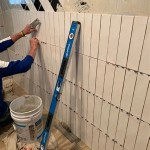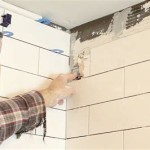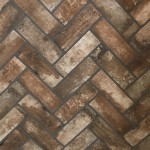Is Ceramic Tile Good For Garage Floors?
Ceramic tile offers a visually appealing and durable flooring option for many areas within a home. However, its suitability for garage floors requires careful consideration. While ceramic tile boasts several advantages, its performance in a garage environment, subject to unique stressors, presents distinct challenges.
One of the primary benefits of ceramic tile is its hardness and resistance to scratches. This makes it capable of withstanding the wear and tear from foot traffic, rolling toolboxes, and even dropped tools, to a certain extent. Furthermore, ceramic tile resists staining, making cleanup of oil spills, grease, and other automotive fluids relatively easy. Its impervious surface prevents these substances from penetrating and causing permanent discoloration.
Ceramic tile also offers a wide range of design options. Homeowners can choose from a variety of colors, patterns, and sizes to create a custom look that complements their overall aesthetic. This versatility allows for seamless transitions between the garage and adjacent interior spaces, enhancing the visual flow of the home.
Despite these positive attributes, the inherent properties of ceramic tile present some drawbacks when utilized in a garage setting. One significant concern is its susceptibility to cracking or chipping under heavy loads. While resistant to scratches, the impact from heavy objects, such as dropped weights or automotive parts, can cause damage. The weight of vehicles parked consistently in the same spot can also contribute to cracking over time, especially if the subfloor isn't perfectly level.
Another potential issue is the tile's vulnerability to temperature fluctuations. Garages are often exposed to extreme temperatures, particularly in regions with harsh winters or scorching summers. These temperature swings can cause the tile and the underlying mortar to expand and contract, leading to cracking and grout failure. This issue is further exacerbated by the presence of moisture, which can freeze and expand within the porous grout lines, causing further damage.
The smooth surface of some ceramic tiles can become slippery when wet, posing a safety hazard, particularly when combined with oil or grease spills. Choosing a tile with a textured surface can mitigate this risk, but caution is still advised. Furthermore, ceramic tile can be a cold flooring option, which may be uncomfortable for those who spend significant time working in the garage. Radiant heating systems installed beneath the tile can address this issue, but they add to the overall installation cost.
Installation of ceramic tile in a garage requires a properly prepared substrate. The concrete slab must be clean, level, and free of cracks or imperfections. Any existing cracks should be repaired, and the surface should be primed to ensure proper adhesion of the mortar. This meticulous preparation is crucial for preventing future cracking and ensuring the longevity of the tiled floor.
The cost of ceramic tile can also be a factor to consider. While the material itself can range in price, the installation process can be labor-intensive, adding to the overall expense. Specialized tools and expertise are often required for proper installation, particularly in larger garages. This can make ceramic tile a more expensive flooring option compared to alternatives such as epoxy coatings or concrete sealers.
Maintenance of ceramic tile in a garage involves regular sweeping or vacuuming to remove dirt and debris. Periodic mopping with a mild detergent can remove stubborn stains. The grout lines require particular attention, as they can be prone to staining and discoloration. Regular sealing of the grout can help prevent staining and prolong its lifespan.
Alternatives to ceramic tile for garage flooring include epoxy coatings, concrete sealers, and interlocking rubber tiles. Epoxy coatings provide a seamless, durable, and stain-resistant surface that is resistant to chemicals and impacts. Concrete sealers offer a cost-effective way to protect the concrete slab from stains and moisture. Interlocking rubber tiles offer a cushioned, slip-resistant surface that is easy to install and maintain.
The decision of whether to use ceramic tile for a garage floor requires a comprehensive assessment of the specific conditions and requirements. Factors such as climate, usage, budget, and aesthetic preferences should all be considered. While ceramic tile can offer a visually appealing and durable flooring solution, its susceptibility to cracking under heavy loads and temperature fluctuations, along with potential slipperiness, requires careful evaluation. Exploring alternative flooring options can provide solutions that better address the unique challenges presented by a garage environment.

Porcelain Tile The Ideal Surface For Garage Flooring Vault Custom Design
Show Me Your Ceramic Porcelain Tiled Floors Good Bad Ugly Experiences The Garage Journal

A Porcelain Tile Garage Floor Long Term Review All Floors

How To Ensure Your Tiled Garage Floor Can Last A Lifetime Vault Custom Design

Garage Floor Tile Options A Guide From Plastic To Porcelain All Floors
Tiling Garage Floor Good Idea What Tile Size Etc Ceramic Advice Forums John Bridge

Garage Floor Tiles Low S And Free Samples

Laying Porcelain Tile For Garage Floor Page 2 6sd Porsche Forum And Luxury Car Resource

Reasons Why You Should Install Porcelain Garage Floor Tile

Installing Garage Floor Tiles Step By Rubi Blog Usa
Related Posts








